Top 20 MCQs on literature review with answers
MCQs on literature review : The primary purpose of literature review is to facilitate detailed background of the previous studies to the readers on the topic of research.
In this blog post, we have published 20 MCQs on Literature Review (Literature Review in Research) with answers.

20 Multiple Choice Questions on Literature Review
1. Literature is a
Written Record
Published Record
Unpublished Record
All of these
2. Which method of literature review involves a non-statistical method to present data having the feature of systematic Method too?
Narrative Method
Systematic Method
Meta-Analysis Method of Literature Review
Meta-Synthesis Method of Literature Review
3. Comparisons of non-statistical variables are performed under which method of literature review?
4. Literature review is not similar to
Annotated Bibliography
5. APA Style, MLA Style, Chicago Manual, Blue Book, OSCOLA are famously known as
Citation Manuals
Directories
Abbreviation Manuals
6. Literature collected is reviewed and preferably arranged
Alphabetically
Chronologically
None of these
7. Literature collected for review includes
Primary and Secondary Sources
Secondary and Tertiary Sources
Primary and Tertiary Sources
8. Literature includes
Previous Studies
Scholarly publications
Research Findings
9. No time frame is set to collect literature in which of the following method of compiling reviews?
Traditional Method
10. Which method of the literature review is more reliable for drawing conclusions of each individual researcher for new conceptualizations and interpretations?
11. The main purpose of finalization of research topics and sub-topics is
Collection of Literature
Collection of Questions
Collection of Statistics
Collection of Responses
12. Literature review is basically to bridge the gap between
Newly established facts
Previously established facts
Facts established time to time
Previous to current established facts
13. The last step in writing the literature review is
Developing a Final Essay
Developing a Coherent Essay
Developing a Collaborated Essay
Developing a Coordinated Essay
14. The primary purpose of literature review is to facilitate detailed background of
Present Studies
Previous studies
Future Studies
15. Narrative Literature Review method is also known as
Advanced Method
Scientific Method
16. Which method of literature review starts with formulating research questions?
17. Which method of literature review involves application of clinical approach based on a specific subject.
18. Which literature review involves timeline based collection of literature for review
19. Which method of literature review involves application of statistical approach?
20. Which literature review method involves conclusions in numeric/statistical form?
More MCQs Related to MCQs on Literature Review
- MCQs on Qualitative Research with answers
- Research Proposal MCQs with answers PDF
- Solved MCQ on legal Reasoning in Research
- MCQ on data analysis in research methodology
- Research Report writing MCQs with answers
- All Solved MCQs on Research Methodology
- MCQs on Legal Research with answers
- MCQs on sampling in research methodology with answers
- MCQs with answers on plagiarism
- MCQ on Citation and Referencing in Research
- Research Ethics MCQs with answers
- Solved MCQs on Sampling in research methodology
- Solved MCQs on Basic Research
MCQs on literature review with answers PDF | Research methods multiple choice questions | Literature review questions and answers
Dr. Sunny is an Assistant Professor in higher education. He has completed his Ph.D. He has a depth of knowledge in the research field and in higher education.
Share this:
1 thought on “top 20 mcqs on literature review with answers”.
Very nice questions for revision
Leave a Comment Cancel reply
Save my name, email, and website in this browser for the next time I comment.
Notify me of follow-up comments by email.
Notify me of new posts by email.

Choose Your Test
- Search Blogs By Category
- College Admissions
- AP and IB Exams
- GPA and Coursework
AP English Literature Multiple Choice: Complete Expert Guide
Advanced Placement (AP)
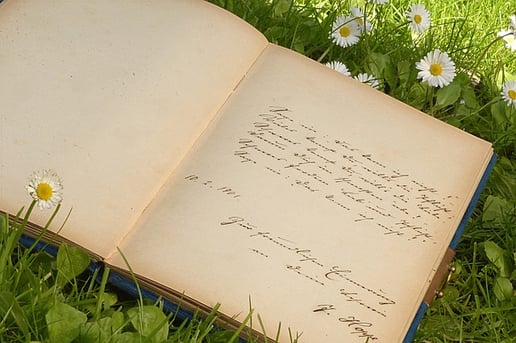
Does the thought of spending an hour answering multiple-choice questions on complex prose and poetry passages strike fear into your heart? The challenge of the AP Literature multiple-choice is enough to give even the most adept reader hives, but don't stress! This fully-updated guide will serve as your complete roadmap to success on the AP English Literature and Composition multiple-choice section.
First, we'll go over what the multiple-choice section looks like—the nuts and bolts. Then, I'll reveal the eight types of multiple-choice questions you can expect to encounter, and how to succeed on them. Next will come study tips, multiple-choice practice resources, and finally things to remember for test-day success!
AP Literature Multiple-Choice Section Overview
AP English Literature and Composition section one is the multiple-choice section. You'll have 60 minutes to answer 55 questions about four to five literary prose and poetry passages.
The date of composition of AP Lit passages could range from the 16th to the 21st century, however, you generally won't be provided with the author, date, or title for any passages (poetry being an occasional exception with respect to title). Most passages come from works originally written in English, although there might occasionally be a translated passage from a notable literary work in a foreign language.
The multiple-choice section is worth 45% of your total exam score. You receive a point for each correctly answered question. Since there's no penalty for guessing on this exam, you should answer every multiple-choice question, even if you have to guess. However, you should only guess after you eliminate any answers you know are wrong. That's the general overview. But what kinds of questions can you expect to see?
The 8 Types of Multiple-Choice AP Lit Questions
There are eight question types you may encounter on the AP Lit exam. In this section, I'll go over each question type and how to answer it. All questions are taken from the sample questions in the "AP Course and Exam Description." Passages for these questions are available there as well.
#1: Reading Comprehension
Reading comprehension questions test whether you understood what the passage was saying on a literal, concrete level. You don't need to flex your interpretation or analysis muscles here—just report what the passage is saying.
You can spot these questions because they usually use words and phrases like "according to," "asserting," and "mentioned." The best strategy for these questions is to go back and re-read the portion of the text associated with the question to make absolutely sure that you are reading it correctly. You may need to read a little before and/or after the moment mentioned to orient yourself and find the most correct answer.

Explanation:
The lines the passage is referring to say, "Spare us all word of the weapons, their force and range / The long numbers that rocket the mind / Our slow, unreckoning hearts will be left behind, / unable to fear what is too strange."
This question is asking why people won't listen to the prophet when he talks about the dangers of weapons. Which of the answers makes the most sense?
Choice (A), "human beings are interested in weapons," might be a tempting choice simply because that's a common theme and message of many works. But nowhere in the passage does it say that humans are interested in weapons! Eliminate it.
Choices (B) and (C) can also both be eliminated because this part of the passage says nothing about nature or love, even indirectly.
Choice (D) may also be tempting simply because it's another common theme in literature—that people don't listen to repeated warnings. But again, there's not really anything in the passage to support that.
This leaves (E), "people cannot comprehend abstract decisions of power." This lines up nicely with the passage, which says that the "hearts" of the people are "unable to fear what is too strange." (E) is the correct answer.

The people in this poem have hearts of stone.
#2: Inference
These questions take you one step beyond simple reading comprehension and ask you to make an inference based on the evidence in the passage—you may be asked about a character or narrator's implied opinion, the author's attitude, etc. This will be something that isn't stated directly in the passage, but that you can assume based on what is actually said in the passage. These questions generally use words like "infer" and "imply."
There are two keys to answering these questions: first, as always, go back and read the part of the passage the question is concerned with. Second, don't be tripped up by the fact that you are making an inference—the best answer will be most supported by what is actually written in the passage . Inference questions are like second-level reading comprehension questions—you need to know not just what a passage says, but what it means.

The first sentence of the passage reads, "Certainly the religious and moral ideas of the Dodson and Tullivers were of too specific a kind to be arrived at deductively from the statement that they were part of the Protest population of Great Britain."
Which choice is the most reasonable inference about the Dodson and Tulliver religious ideas based on the first sentence?
Choice (A) says "the narrator is unable to describe them with complete accuracy." This might be true, but there's nothing in the first sentence to support this inference—the narrator says that their ideas are "too specific," not they the narrator can't describe them accurately. Eliminate Choice (A).
Choice (B), "they have no real logical foundation" may also be true, but can't be inferred from the sentence, which gives no indication of whether their beliefs are logical or not.
Choice (C) may be tempting—the idea that they cannot be appreciated by anyone who doesn't share them might seem to dovetail nicely with the fact that they are "too specific" for the mainstream Protestant population. But is this the best choice that's most supported by the passage? Let's keep it in mind but consider the remaining answers.
Choice (D) posits that the beliefs of the Dodsons and Tullivers "spring from a fundamental lack of tolerance." This is a leap that is not supported by what the first sentence actually says; eliminate it.
Choice (E) says that their beliefs "are not typical of British Protestants in general." The sentence says that their beliefs are "too specific" for one to know them simply because the Dodsons and Tullivers identify as British Protestants, which implies that their beliefs in fact do not "match up" with mainstream British Protestant beliefs.
Choice (E) is the inference most supported by the passage, then—even more supported than Choice (C). So, (E) is the answer. Remember, multiple answers may seem like they could be correct, but only the best answer is the correct one.
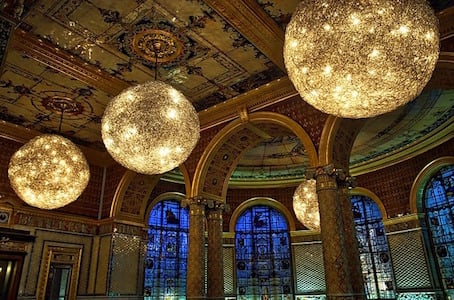
Do you think appropriately ornate churches are also important to the Dodsons and Tullivers?
#3: Interpreting Figurative Language
These questions ask you to interpret what figurative language means in the context of the passage. They're are identifiable because they will either outright mention figurative language or a figurative device, or there will be a figurative language phrase in the question itself.
Once again, the most important thing you can do to be successful on these questions is to go back and re-read! For figurative language, the meaning is very much dependent on the phrase's context in the passage. Consider what is said around the figurative phrase and what the phrase is referring to.

This questions asks you to interpret what the figurative phrase "that live tongue" means. To orient you in the poem, these stanzas are advising the prophet to "speak of the world's own change" (13).
The poem states, "What should we be without / The dolphin's arc, the dove's return, / these things in which we have seen ourselves and spoken? Ask us, prophet, how we shall call / our natures forth when that live tongue is all / Dispelled, that glass obscured or broken."
In the context of the poem, right the narrator asks what we are without "that live tongue," the poem speaks of how we "see ourselves" in "the dolphin's arc" and "the dove's return." These are images of nature. The best interpretation of "that live tongue," then, is answer (A), as a metaphor for nature. In essence, the stanza means, "Ask us, prophet, how we shall know ourselves when nature is destroyed."

The dolphin's arc.
#4: Literary Technique
These questions ask why the author uses particular words, phrases, or structures. Essentially, what purpose do such choices serve in a literary sense? What effect is created? These questions often include words like "serves chiefly to," "effect," "evoke," and "in order to."
Of course to approach these questions, re-read the part of the passage referred to. But also ask yourself, why did the author use these particular words or this particular structure? What is being accomplished by this specific literary "move"?

This stanza containing the repetition of "ask us" reads: "Ask us, ask us whether with the worldless rose / Our hearts shall fail us; come demanding / Whether there shall be lofty or long-standing / When the bronze annals of the oak-tree close."
So what is the effect of repeating "ask us, ask us"? Choice (A) says it suggests the prophet is causing much of the world's misery. There's nothing in the stanza—or even the entire poem—to suggest this, so we can eliminate it.
Choice (B) says it represents a sarcastic challenge. This stanza doesn't read as sarcastic, though, but very serious—eliminate (B).
Choice (C) says it suggests the speaker is certain of the answer the prophet will give. This doesn't really make sense because the speaker isn't actually asking the prophet questions, but telling the prophet what questions to ask. Eliminate (C).
Choice (D) says it makes the line into perfect iambic pentameter. You can eliminate this one without even worrying about what syllables are emphasized because a perfect line of iambic pentameter has 10 syllables and this line has 11. This leaves (E)—the effect is to provide a "tone of imploring earnestness." Given that the speaker seems to be begging the prophet to ask particular questions, this fits. (E) is the correct answer.

#5: Character Analysis
Character analysis questions will ask you to identify something about a character—their opinions, attitudes, beliefs, relationships with other characters, and so on.
In many ways this is a special type of inference questions, because you are inferring broader traits of the character based on the evidence presented in the passage. As you might expect, character questions are asked much more frequently for prose passages than poetry ones.
The key here is to pay attention to everything that is directly stated about the character(s) in the relevant parts of the passage. Like in an inference question, there will be an answer that best fits with the evidence in the passage.

These lines read, "Their religion was of a simple, semi-pagan kind, but there was no heresy in it—if heresy properly means choice—for they didn't know there was any other religion except that of chapel-goers, which appeared to run in families, like asthma."
Choice (A) purports that this part of the passage draws attention to the Dodson sisters' devotion to certain rituals. No rituals are mentioned here; (A) can be eliminated.
Choice (B) says these lines point to their "untroubled complacency." The passage states that they didn't know of any other religion. If they don't know, we can reasonably infer that they are not troubled by their own religion. Keep (B) in the running.
Choice (C) purports they have "deep religious conviction." This seems like a bit of a leap; all the passage really states is that their religions if "semi-pagan," but not heretical because they simply don't know any other religion other than "chapel-goers" which seems to be tied to family lineage. We can't reasonably infer that they have strong religious conviction from this. Eliminate (C).
Choice (D) states that they have "disturbed consciences." Again, nothing in the passage makes this a reasonable conclusion; if they don't know there could be other religious traditions, why would they be disturbed by their own?
Choice (E) says they have a "sense of history and tradition." This might be a tempting choice because they point to the fact that the religion of "chapel-goers...appeared to run in families." But that's not their religion, so this isn't a well-supported inference.
Thus, Choice (B) provides the most reasonable inference about the Dodson sisters and is the correct answer.
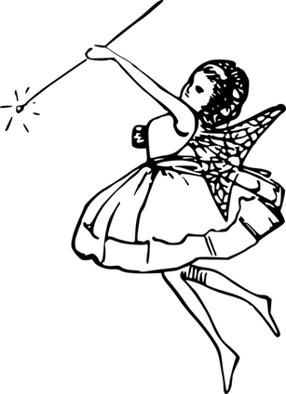
Quite a character.
#6: Overall Passage Questions
These questions will require you to take a "bird's-eye view" of the passage and identify or describe a characteristic of the passage as a whole : its purpose, tone, genre, and so on. These can be difficult because you can't simply go back to a specific place in the passage to find the best answer; you need to consider the passage overall.
Consider the overall picture created by the tiny details. I strongly recommend marking up texts for main themes, purpose, tone, etc on the first read-through so that you can consult your margin notations for these kinds of questions.

It is clear through even a quick scan of this passage that the narrator goes on at length about the Dodsons, so we can surmise that the narrator is most concerned with something about the Dodsons. We can eliminate (B) and (C), then, as they don't say anything about the Dodsons.
So what about the Dodsons is the narrator most concerned with? The first sentence mentions their "religious and moral ideas," but then describes their "semi-pagan" but not heretical religion. We then see "the religion of the Dodsons consisted in revering whatever was customary and respectable" (22-23), followed by a long list of what that is.
The rest of the passage similarly describes what the Dodsons believe is important, from being "richer than was supposed" to doing right thing "towards kindred." It is clear, then, that the narrator is most concerned with describing the values of the Dodsons, which aligns with choice (A).
#7: Structure
These questions ask about specific structural elements of the passage. Often you'll be asked about shifts in tone, digressions, or the specific form of a poem.Sometimes these questions will point to a specific part of the passage/poem and ask you to identify what that part of the passage is accomplishing within in the larger excerpt.
This is another question type where marking the passage on your first read-through will be very helpful—be sure to mark any shifts in structure, tone, genre, etc as you read, and any structural elements that seem unusual or significant.

Lines 1-34 describe an image of the narrator playing his lute for his love. Lines 34-43 establish that the narrator is about to introduce an idle thought (yes, this is a loquacious poem). Lines 44-48 read: "And what if all of animated nature / Be but organic Harps diversely fram'd, / That tremble into thought, as o'er them sweeps / Plastic and vast, one intellectual breeze, / At once the Soul of each, and God of all?"
So what's the narrator saying here? He is wondering if "all of animated nature" (so all living things) are just harps, and thought is the strings being played. This is clearly metaphorical, and the third footnote for the passage tells us that "lute" is a synonym for "harp." So the answer is (D)—this part of the passage functions as a "metaphorical application of the image of the lute."
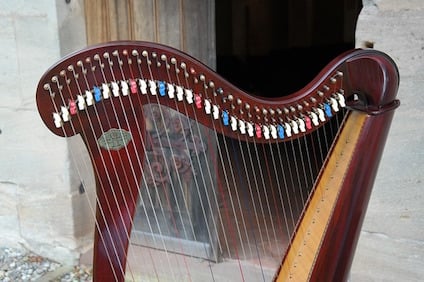
It's a harp! No, it's a lute! No, it's both!
#8: Grammar/Nuts & Bolts
Very rarely, you will be asked a question on the grammar of a part of a passage —like identifying what word an adjective is modifying. Very specific questions about the meter of a poem (i.e. iambic pentameter) would also fall into this category. These questions are not so much about literary artistry and more about the dry technique requisite for a fluent command of the English language.
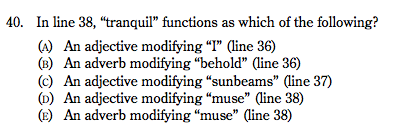
The section of the poem concerned reads, "Of yonder hill I stretch my limbs at noon, / Whilst through my half-clos'd eye-lids I behold / The sunbeams dance, like diamond, on the main, / And tranquil muse upon tranquility."
What a mouthful! If we can untangle this sentence, figuring out what "tranquil" is modifying will be fairly easy. First, though, we can eliminate all answers that call "tranquil" an adverb, because the adverb form of "tranquil" is "tranquilly." Eliminate (B) and (E).
In the sentence, we have that the speaker ("I") is beholding the sunbeams dancing. Then we have "and" followed by another verb in "muse." How do we know "muse" is a verb here? Because otherwise the clause "and tranquil muse upon tranquility" has no verb and makes no sense. Since "muse" is a verb, it can't be modified by an adjective, so eliminate choice (D). This leaves (A) and (C). Does it make sense for "sunbeams" to muse upon tranquility? Not particularly; it makes much more sense for the speaker (I) to muse upon tranquility. Choice (A) is the correct answer.

So are these sunbeams dancing?
How to Prepare for AP Literature Multiple Choice
I have several tips on how you can best position yourself for success on the AP Lit multiple-choice section.
Read a Variety of Literary Works and Poems
Because the passages on the AP Literature multiple-choice section come from a variety of eras, genres, authors, and styles, it's important to familiarize yourself with a wide variety of English literary styles so that you will feel comfortable with the passages and able to parse what they are saying without becoming overwhelmed.
Read a lot of everything: prose of course, but poetry in particular, as many students are less familiar with poetry already and poetry can be fairly opaque and hard to analyze. As a starting place for things you could read, check out our AP Lit reading list guide.
When you start to feel comfortable with the language of many eras and styles, it's time to work on honing your close-reading skills.
Hone Your Close Reading Skills
Your ability to read closely—to read passages not just for comprehension but with an eye for how the author uses literary technique—is paramount on the multiple-choice section. You will practice on close-reading prose and poetry in class, but extra practice can only help you.
When you're doing all of your reading from different eras and genres, think about what the author is doing and why he or she is doing it. What techniques are being deployed? What motifs and themes are there? How are characters portrayed?
If you're stumped as to how to go about this, here are some prose close-reading resources:
- You can get close-reading guides online from The University of Wisconsin-Madison's writing center and the Harvard College Writing Center.
- The Purdue OWL also has an article on steering clear of close-reading "pitfalls."
Here are some close-reading resources for poetry:
- Here's a poetry reading guide from The University of Wisconsin-Madison .
- You should definitely check out this truly excellent guide to reading poetry from Poets.org, which comes complete with two poetry close-readings.
Learn Literary and Poetic Devices
You'll want to be familiar with a literary terms so that any questions that ask about them will make sense to you. Again, you'll probably learn most of these in class, but it doesn't hurt to brush up on them. Check out our guide to the 31 literary devices you need to know , complete with definitions and examples.
Complete Practice Questions and Take Practice Multiple-Choice Sections
To succeed on the multiple-choice section, practice taking multiple-choice questions! This may seem like a no-brainer but it's still very important nonetheless. Set aside time to take a sizeable number of practice questions every week.
Keep track of what kinds of questions are easy for you—do you identify the theme every time?—and which ones are hard—stumped by similes? This will help you figure out if there are any skills or concepts you need to brush up on.
You should also take a complete multiple-choice practice section at least once, twice if you are able. You could do this as part of a complete practice test (which I recommend) or do it separately. But taking a multiple-choice section under AP-like conditions will help you feel prepared, calm and collected on test day.
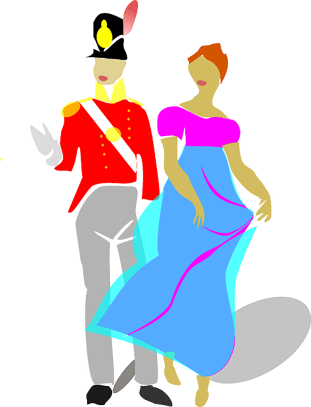
As prepared as a Regency belle who has snagged an officer!
AP Literature Multiple-Choice Practice Resources
There are a variety of practice resources available that you can use to hone your multiple-choice skills for the AP English Literature and Composition exam. The gold standard for the best multiple-choice practice questions is the College Board. This is because they write the AP exam, so their practice questions are the most like the real AP multiple-choice questions you'll see on test day. They offer both complete released exams and sample questions.
Even once you run out of official College Board practice questions, there are still unofficial resources you can use to hone your multiple-choice skills. In this section I'll go over both.
Official Resources
See below for three potential sources of official College Board questions.
Released College Board Exams
There are three official released College Board Exams. Each has a complete multiple-choice section of 55 questions. Here are the links!
- 1987 AP English Literature and Composition Exam
- 1999 AP English Literature and Composition Exam
- 2012 AP English Literature and Composition Exam
Sample Questions from the Course and Exam Description
The AP English Literature Course and Exam Description has 10 practice multiple-choice questions!
Your Teacher
Your AP teacher may also have copies of old AP exams that you can use for practice. Ask and see!
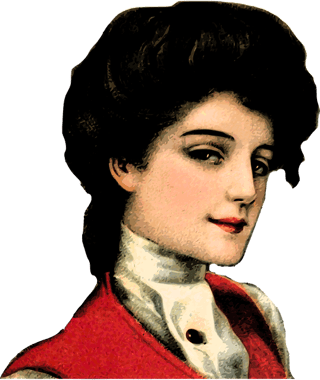
In my mind, all English teachers look like they came from the 19th century.
Unofficial Resources
In addition to the multiple-choice practice questions provided by the College Board, there are also several places online where you can get unofficial multiple-choice practice questions. However, they aren't all worth your time in terms of quality. I'll go over the best ones here. For an even more robust list, check out our complete list .
Albert AP English Literature Quizzes
Albert offers multiple-choice quizzes divided into prose, poetry, and drama categories. You are given the title, date, and author of the work--which you will not receive on the real AP exam. Like the Varsity Tutors quizzes, Albert offers questions that test similar skills as the AP exam, but the questions are worded differently . Additionally, you'll need to pay for an account to access most of the materials.
Another solid option for getting more practice multiple-choice questions is a good review book. You want to make sure it's high quality—I recommend Barron's for the AP Literature exam in particular, as their questions do resemble real AP questions in difficulty and writing style.

You will not, however, receive an atmospheric picture of the setting.
Test Day Tips for AP Lit Multiple-Choice Success
Don't rely on your memory of the passage when answering questions. Always look back at the passage, even if you think the answer is obvious!
Interact with the passages—circle, mark, underline, make notes, whatever floats your boat. This will help you retain information and actively engage with the passage. Especially mark areas where there seems to be some kind of transition or change, as it's highly likely that you will be asked questions about these transitions!
It may also be helpful for you to jot some quick notes on the overall theme or motif of the passage/poem once you reach the end. This will help you on questions about the passage overall.
If you're having trouble making sense of a passage, skip it and move on to the next one. Odds are when you come back to it later, you'll find it much easier to understand. And if you don't, at least you didn't waste too much time puzzling it out before you answered the questions about other, easier passages.
Acing the AP Lit Multiple Choice: Key Takeaways
The first section of the AP English Literature and Composition Exam is an hour-long, 55-question multiple-choice test about four-five literary and prose passages. This section is worth 45% of your total exam score.
There are eight kinds of questions you can expect to see on the multiple-choice section:
#1: Reading Comprehension #2: Inference #3: Identifying and Interpreting Figurative Language #4: Literary Technique #5: Character Analysis #6: Overall Passage Questions #7: Structure #8: Grammar/Nuts and Bolts
Here's how to best prepare to crush the multiple-choice sections:
#1 : Read a variety of literary works and poems, from all of the eras and genres covered by the test!
#2 : Hone your close-reading skills so you can identify what writers are doing and why they are doing those things.
#3 : Learn literary techniques and terms and how to identify and apply them!
#4 : Practice for the exam by taking practice sections and practice questions.
There are a variety of official and unofficial resources available to practice. The best are College-Board official, but once you run out of those, there are also high-quality unofficial resources available.
Here are some test-day tips to help you hit an English Lit home run:
#1 : Always look back at the passage when answering questions—don't rely on memory!
#2 : Interact with the passages as you read through them, including marking significant moments and structural or tonal shifts in the text.
#3 : You may also wish to write a couple of quick notes about the overall theme(s) and motifs of the passage at the end, to refer to when answering overall passage questions.
#4 : If the language of a passage is hard to parse, skip it and come back later. Odds are it will make much more sense the second time around, and if it doesn't, at least you didn't waste time that you could have spent answering easier questions.
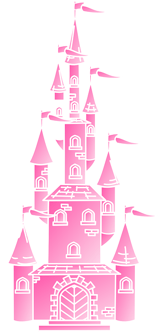
And then you lived happily ever after.
What's Next?
Need more resources for AP English Literature? See our complete guide to the AP Literature Exam , our complete list of AP English Literature practice tests , and our AP English Literature Reading List .
Also taking AP Language and Composition? We have an expert guide to AP Lang and Comp , a comprehensive list of AP Language and Composition practice tests , and a list of 55 AP English Language terms you must know.
If you're taking other AP exams, check out our five-step AP study plan , when to start studying for AP exams , and how to find the best AP practice tests .

Trending Now
How to Get Into Harvard and the Ivy League
How to Get a Perfect 4.0 GPA
How to Write an Amazing College Essay
What Exactly Are Colleges Looking For?
ACT vs. SAT: Which Test Should You Take?
When should you take the SAT or ACT?
Get Your Free

Find Your Target SAT Score
Free Complete Official SAT Practice Tests
How to Get a Perfect SAT Score, by an Expert Full Scorer
Score 800 on SAT Math
Score 800 on SAT Reading and Writing
How to Improve Your Low SAT Score
Score 600 on SAT Math
Score 600 on SAT Reading and Writing
Find Your Target ACT Score
Complete Official Free ACT Practice Tests
How to Get a Perfect ACT Score, by a 36 Full Scorer
Get a 36 on ACT English
Get a 36 on ACT Math
Get a 36 on ACT Reading
Get a 36 on ACT Science
How to Improve Your Low ACT Score
Get a 24 on ACT English
Get a 24 on ACT Math
Get a 24 on ACT Reading
Get a 24 on ACT Science
Stay Informed
Get the latest articles and test prep tips!

Ellen has extensive education mentorship experience and is deeply committed to helping students succeed in all areas of life. She received a BA from Harvard in Folklore and Mythology and is currently pursuing graduate studies at Columbia University.
Ask a Question Below
Have any questions about this article or other topics? Ask below and we'll reply!
- Prepositions
- Conjunctions
- Interjections
- Conditionals
- Punctuation
- English Literature
- Word Search
- Flash Cards
- Trivia Quizzes
- Find the Word
English Literature Multiple Choice Questions And Answers Online
Are you preparing for an upcoming English Literature exam or simply looking to test your knowledge in this vast and fascinating field? Our “English Literature Multiple Choice Questions And Answers Online” tool is designed to provide literature enthusiasts and students alike with an engaging way to learn and review classic and modern literary works, authors, and movements.
Comprehensive Question Bank
Our online tool is stocked with a diverse range of questions that cover various periods of English literature, from the Middle Ages to contemporary writings. Whether you’re brushing up on Shakespeare, delving into the Romantic poets, or exploring post-modernist texts, our quiz has you covered. Each question is carefully selected to challenge your understanding and appreciation of English literature.
Real-Time Feedback
As you navigate through the quiz, you will receive instant feedback on your answers. Choose an answer, and you’ll immediately see if you’ve selected the correct option. This immediate response helps reinforce learning and allows you to retain information more effectively.
Customizable Quizzes
One of the standout features of our online quiz tool is the ability to customize your quiz experience. Select your preferred difficulty level, the number of questions you wish to answer, and even specify the literary periods you’re interested in. This personalization ensures that you’re focusing on the content that is most relevant and beneficial to your learning goals.
User-Friendly Interface
The “English Literature Multiple Choice Questions And Answers Online” tool boasts a clean, user-friendly interface that is accessible on various devices. Whether you’re on a desktop computer, a tablet, or a smartphone, the responsive design ensures that your quiz experience is seamless and enjoyable.
Score Tracking and Progress
Keep track of your progress with our scoring system that displays your results at the end of each quiz. Watch as your scores improve over time, indicating your growing knowledge and understanding of English literature.
A Resource for Students and Educators
This tool is not only for individuals but also serves as a valuable resource for educators. Teachers can incorporate it into their lesson plans, assign it as homework, or use it to prepare quizzes and tests. It’s a versatile platform that supports and enhances the learning process.
SEO Features
To ensure that our tool reaches those who will benefit from it the most, we’ve optimized it for search engines by using targeted keywords, meta descriptions, and alt tags that accurately reflect the content and purpose of the quiz. By ranking higher on search engine results pages, we make it easier for students and literature enthusiasts to find and access our tool.
Get Started Today
Dive into the rich world of English literature with our online quiz tool. It’s completely free, easy to use, and an excellent way to enhance your understanding of literary works. Whether you’re studying for a test, looking for a productive break, or just curious about English literature, our tool is the perfect solution.
Start your literary journey now with the “English Literature Multiple Choice Questions And Answers Online” tool!

- Request new password
- Create a new account
Multiple Choice Questions
Research methodology.
Have an account?
Suggestions for you See more

Vowels and Consonants
Past tense and past perfect tense, 35.4k plays, picture comprehension, subject and predicate, compound words, kg - 1st .

Review of Related Literature
10 questions

Introducing new Paper mode
No student devices needed. Know more
The review of related literature includes which of the following type of research sources?
Primary Sources
Secondary Sources
Online Sources
All of the above
The review of related literature allows us to identify the questions that are still needed to be answered regarding a research topic.
Which of the following roles of RRL does this refer to?
The RRL leads to definitions of problems, selection of methods, and interpretation of findings.
The RRL reports contribution of others to the study.
The RRL states the stand of the researcher on conflicting views relative to the study.
The RRL provides sources of significant problems.
It refers to the traits, attributes, or even symbols which measurements vary among the subjects or objects of study.
Research Problems
Research Questions
Research Variables
Research Sources
Which type of research variables can be manipulated or controlled by the researchers?
Independent Variable
Constant Variable
Dependent Variable
None of the above
The review of related literature prevents researchers to reiterate the discussions that had already been made by previous researchers.
The RRL points out authoritative evidences supportive of the study.
The RRL helps us conceptualize and justify the research because an extensive review can assure no duplication.
Tell whether the statement below is TRUE or FALSE.
The dependent variable is the cause and the independent variable is the effect.
Research Variables can identified with the use of _________________.
Research Introduction
Research Methods
The review of related literature enables researchers to look through research instruments from previous researches that can also be used to answer their own research questions.
The RRL provides source of significant problems.
Research Problem:
The researchers intend to find out how the different kind of sports student-athletes play help develop their critical thinking.
Which of the following is the BEST independent variable for the problem?
Types of Sports
Age of Student-Athletes
Score on Critical Thinking Assessment
The researches would like to know how too much exposure to gadgets affects the eye-sight of 15-year old students.
Which of the following is the BEST dependent variable for this problem?
Age of Students
Number of hours the eyes were exposed to gadgets
Eye Grade After Excessive Exposure
Explore all questions with a free account

Continue with email
Continue with phone

50 Literature Quiz Questions and Answers
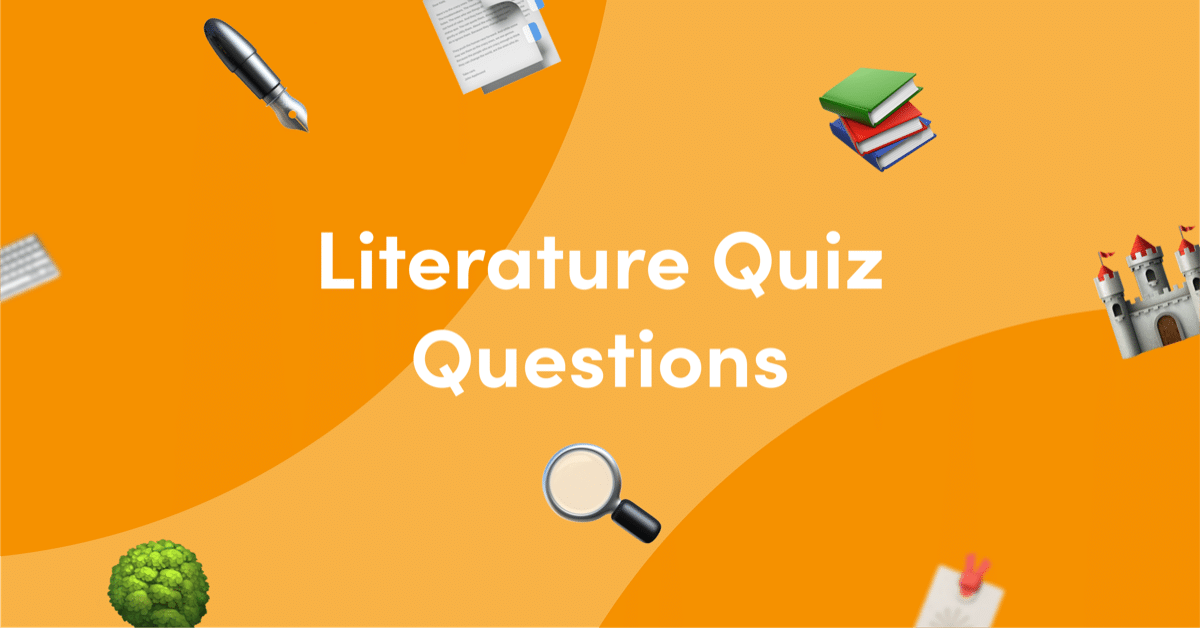
Is curling up with a good book your idea of heaven? Do you marvel at the literary greats and love finding a new classic?
If you answered an enthusiastic yes to the above, we’ve put together the perfect rainy day activity for you (apart from reading, of course!), with our 50 literature quiz questions and answers.
Through our literature quiz, we’ll test your knowledge of all the classics – both modern and old-school – as well as quiz you on all the hottest books right now. We take a look at authors, sagas and all the good stuff that makes reading so magical.
There’s something for everyone in our literature quiz questions and answers, and who knows, maybe you’ll even find some new inspiration for your reading bucket list while you’re at it…
Literature Quiz Questions and Answers
- Who wrote the classic novel ‘The Catcher in the Rye’?
- Winston Smith is the protagonist of which George Orwell novel?
- What magazine does Stieg Larsson’s character Mikael Blomkvist work at, and part own in ‘The Girl With The Dragon Tattoo’ and its subsequent novels?
- Which small Yorkshire town inspired the setting for Emily Bronte’s ‘Wuthering Heights’?
- Where does Connell move to in the conclusion of Sally Rooney’s ‘Normal People’?
- Jacob Marley and Bob Cratchit are characters from which Charles Dickens novel?
- In ‘Gone Girl’, what type of “girl” does Amy pretend to be when she first meets Nick?
- Answering to the nearest 100, how many pages long is Stephen King’s ‘IT’?
- James Joyce’s ‘Ulysses’ is loosely based on which epic poem?
- What job does Louisa take on a whim after being fired as a waitress in ‘Me Before You’?
- Who wrote the critically acclaimed 2015 novel ‘A Little Life’?
- In which mythical land are the ‘Lord of the Rings’ books set?
- In ‘Pride and Prejudice’, what is the full name of Elizabeth Bennet’s love interest?
- Co-written with John Fletcher, what is the last surviving play written by William Shakespeare, before his subsequent retirement and death two years later?
- How many books are there in the Harry Potter series?
- In whose thriller series do we follow Oslo detective Harry Hole, as he investigates violent crimes in the Norwegian capital?
- In ‘The Lion, The Witch and The Wardrobe’, which of the Pevensie siblings first enters Narnia?
- On which African river is Agatha Christie’s 1937 novel set?
- What is the name of Harper Lee’s debut novel?
- Who controversially won the Nobel Prize in Literature in 2016, making him one of only two songwriters to ever win the prestigious literary award?
- Natasha Rostov is the heroine of which classic Russian novel?
- In ‘The Great Gatsby’, what is located at the end of Daisy Buchanan’s dock?
- Which astronomically popular series of books, released in the 2000s, begins with a teenage girl moving to the small town of Forks, Washington?
- Where in Spain is ‘Don Quixote’ set?
- What do George Eliot, George Sand and Acton Bell all have in common?
- ‘Good Omens’, ‘American Gods’ and ‘Coraline’ are all books written by which author?
- What is the title of the first book to feature the character Sherlock Holmes?
- ‘The Curious Incident of the Dog in the Night-Time’ was written by which British author?
- In ‘Red, White & Royal Blue’, who does Alex fall in love with?
- In ‘The Kite Runner’, how are Amir and Hassan related?
- What genre of book does Danielle Steel primarily write?
- Anastacia Steele is the main protagonist in which series of books?
- As of August 2023, whose autobiography was the fastest-selling non-fiction book ever?
- Humbert Humbert is the unreliable narrator and main character of which book by Vladimir Nabokov?
- What is the main character and narrator called in Daphne du Maurier’s ‘Rebecca’?
- What literary movement does Ryū Murakami belong to?
- Which Bronte sister wrote the novel ‘Villette’?
- How many books are there in ‘The Hunger Games’ series of novels?
- The Republic of Gilead is a totalitarian and theocratic state in which dystopian novel published in 1985?
- Who wrote the novel ‘Tinker Tailor Soldier Spy’?
- Which book by Mary Shelley is often regarded as the first science fiction novel?
- What kind of ‘phile’ is somebody who loves to read regularly?
- Which of the following is NOT a book by John Green; ‘The Fault in Our Stars’, ‘Paper Towns’, or ‘The Sun Is Also a Star’?
- Who is attributed to the following quote: “A reader lives a thousand lives before he dies. The man who never reads lives only one”?
- How many husbands did Evelyn Hugo have?
- Which of the following pieces of literature was NOT a book in its original format; ‘Gone with the Wind’, ‘Hitchhiker’s Guide to the Galaxy’, ‘Oh, the Places You’ll Go!’ or ‘Where the Crawdads Sing’?
- Elio and Oliver are the main characters in which LGBTQ book?
- Answering to the nearest five, what year was ‘The Bell Jar’ by Sylvia Plath originally published?
- Which of the following detective characters features in Jefferey Deaver’s novels; Alex Cross, Lincoln Rhyme, or Myron Bolitar?
- What is the most printed book of all time?

- D. Salinger
- A Christmas Carol
- A cool girl
- The Odyssey
- Carer/Caretaker
- Hanya Yanagihara
- Middle-earth
- Fitzwilliam Darcy
- The Two Noble Kinsmen
- River Nile (for ‘Death on the Nile’)
- To Kill A Mockingbird
- War and Peace
- The Green Light
- They are male pseudonyms used by female authors
- Neil Gaiman
- A Study in Scarlet
- Mark Haddon
- Prince Henry
- They are half-brothers
- Fifty Shades of Grey
- Prince Harry
- We never learn her name
- Postmodernism
- Charlotte Bronte
- The Handmaid’s Tale
- John le Carré
- Frankenstein
- Bibliophile
- The Sun Is Also a Star
- George R. R. Martin
- Hitchhiker’s Guide to the Galaxy
- Call Me By Your Name
- Lincoln Rhyme
If you enjoyed these literature quiz questions and answers, why not check out some of our other quizzes? Here’s some of our favourites!
You may also like:
• General knowledge quiz questions and answers • Music quiz questions and answers • Movie quiz questions and answers • TV quiz questions and answers • Sport quiz questions and answers • History quiz questions and answers • Geography quiz questions and answers • Capital cities quiz questions and answers • Food and drink quiz questions and answers • True or false quiz questions and answers • Friends quiz questions and answers • The Simpsons quiz questions and answers • Harry Potter quiz questions and answers • Star Wars quiz questions and answers • Marvel quiz questions and answers
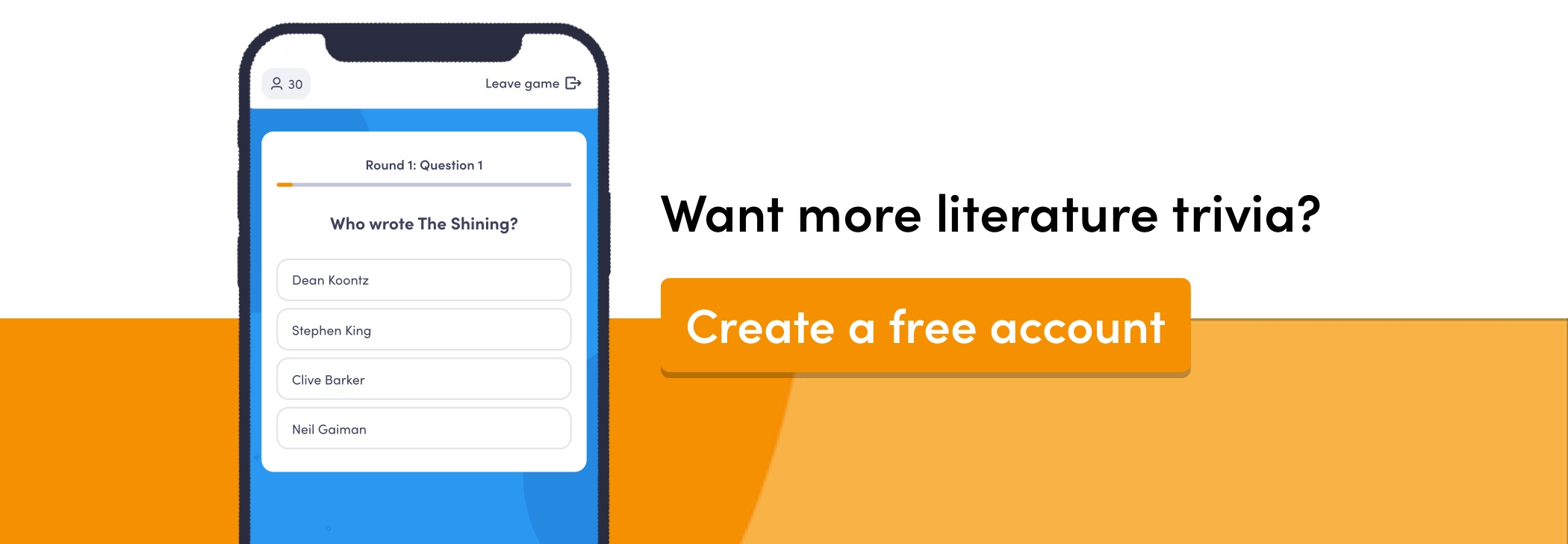
Recent Posts

50 Euros 2024 Quiz Questions and Answers
Jun 4, 2024

25 Bridgerton Quiz Questions and Answers
May 17, 2024
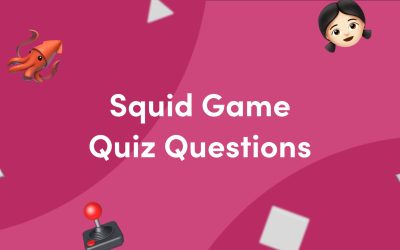
25 Squid Game Quiz Questions and Answers
Apr 4, 2024
Fancy a quiz?
Literature MCQs
English Language MCQs Topics
General MCQs
Linguistics MCQs
These Literature multiple-choice questions and their answers will help you strengthen your grip on the subject of Literature. You can prepare for an upcoming exam or job interview with these Literature MCQs. So scroll down and start answering.
1: In "bernice bobs her hair," bernice is the _______ in the story.
A. Symbol of fun
B. Stock character
C. Protagonist
D. Genre
2: ______________ themes are applicable to any group or culture at any time in history.
A. Recurring
B. Universal
C. Heroic
D. Open-ended
3: The narrator of a poem is known as the __________.
A. Implied
B. Author
C. Persona
D. Speaker voice
4: A _____ sentence helps to give additional evidence for a claim or a main idea.
A. Figurative Language
B. Supporting Evidence
C. Supporting
D. Supporting Sentence
5: Alternative weekly papers are having ______ circulation.
A. Format
B. Muckraker
C. Declining
D. The blacklist
6: ______________ is the basic material out of which most plots are made.
A. Conflict
B. Exposition
C. Crisis

7: Two or more paragraphs that explain and develop a complex, key idea are called _____.
A. Transitional passages
B. Clarification paragraphs
C. Essay unifiers
D. Paragraph blocks
8: School warning markings are __________ or yellow pavement markings that read school zone.
A. Blue
B. Green
C. Purple
D. White
9: Sending an e-mail to a client to ask for certain data is an example of a _____.
A. Two minute action task.
B. Three minute action task.
C. Four minute action task.
D. Five minute action task.
10: Trade occurs, generally speaking, because it is a _______ sum game.
A. Positive
B. Negative
C. Neutral
D. None of above
11: In ""The Pardoner's Tale,"" Death is portrayed as ____________.
A. Both the price of wickedness and an actual person
B. Both a skeletal figure and an evil angel
C. An old man selling wares by the side of the road
D. An archangel who kills people through natural disaster and war
12: Literature in play form is also known as __________.
A. Drama
B. Nonfiction
C. Prose
D. Fiction
E. Prose
F. Poetry
13: The antagonist usually brings __________ to the __________.
A. Peace . . . main character
B. Irony . . . plot
C. Conflict . . . protagonist
D. Resolution . . . setting
14: "o death, where is thy sting?" is an example of _____.
A. Oxymoron
B. Hyperbole
C. Metaphor
D. Apostrophe
15: Argumentative or persuasive types of writing are also called _____.
A. Exposition
B. Illustrative
C. Writing
D. Propaganda
E. Vignette
16: It is better to read ______.
A. In a loud place
B. At the end of the day
C. In long blocks
D. In a quiet location
17: Metonymy is best defined as a figure of speech in which __________.
A. Human characteristics are attributed to objects or animals
B. One noun is substituted for another with which it is closely associated
C. Exaggeration is used for emphasis
D. A part of something stands for the whole
18: In a topical paragraph, each sentence should support the _____.
A. Revolves around a main idea that is expressed in its topic
B. Formatting Excerpts
C. Five Points of Illuminating
D. Coordinating Conjunctions
19: Archetypes are useful in literature because __________.
A. Courageous and goal-oriented characters.
B. Archetypes portray characters in conflicts and events ...
C. Heaven vs. Wilderness/ in unusual places
20: During the drafting stage of the writing process, you _____.
A. Check your facts for accuracy
B. Caring for Your House Cat
C. Do more investigation of your topic
D. Building a writing portfolio
21: During the revising stage in the writing process, the author _____.
A. Drafting
B. Brainstorming
C. Clustering
D. Tranistion
E. Prewriting
22: In autobiographical writing, the purpose of the exposition is to _____.
A. Nonfiction
C. Propaganda
D. John Smith
23: One reason for making a new outline of your work while revising is to _____.
A. Prepare your work for your writing portfolio.
B. Faulty coordination
C. Sentence flow
D. Circular subordination
24: The greek term "peripeteia" refers to the __________.
A. Scene of suffering
B. Reversal of situation
C. Recognition
D. Exodos
25: The quality of making writing short and unified is called _____.
A. Conciseness
B. Illustrative writing
C. Autobiography
D. Exposition
E. Expository
26: The structure of "ballad of birmingham" by dudley randall is described best as __________.
A. A sonnet
B. An elegiac broadside
C. A broadside ballad
D. Free verse
27: The written language used by the ________ is hieroglyphics.
A. Egyptians
B. Athena
C. Persians
D. Centaurs
28: When editing your essay for verb tense, it is important to _____.
A. Make time shifts only after your topic has been fully explained
B. Alternate verb tenses frequently throughout your paper
C. Ensure that each paragraph maintains the same verb tense throughout
D. Change verb tenses to refer to future events within sentences
29: Elements of tone include _____.
A. Diction
B. Details
C. Dialogue
D. Imagery
E. Setting
30: All of the following information should be researched before a job interview except _____.
A. The occupational field
B. The employer
C. The office dimensions
D. The specific job
31: All of these types of figurative language appear in the excerpt above except __________.
A. Simile
B. "Ah, when she moved, she moved more ways than one:"
C. "I swear she cast a shadow white as stone."
D. The subject of the poem is deer and the flight risk that they pose.
32: The stage of plot that comes directly after exposition is called _____
A. Resolution
B. Climax
C. Rising action
33: ?tone? refers to the __________.
A. The reader's response to the writing and the writer
B. The way a piece looks on the page, including font and color
C. The way a piece is written, its manner of expression
D. The writer's attitude toward the writing and audience
34: When revising the overall structure of your essay, you should _____.
A. Analyze the balance of information
B. The overall structure of an essay consists of the ...
C. .include sentences of various lengths analyze the balance of information
D. List specific questions about both subjects
35: A metagoal refers to _____.
A. The overall amount of energy devoted to any given purchase
B. The general nature of the outcome being sought
C. The conscious thinking of all decision processes
D. Using nonfinancial criteria to make purchase decisions
E. None of the above
36: According to poe, there is a radical error in the __________.
A. Consideration of an effect
B. Elaborate and vacillating crudities of thought
C. Red paint and the black patches
D. Usual mode of constructing a story
37: Pontificating is ________.
A. Not changeable
B. Speaking in a pompous way
C. Both a and b
D. None of these
38: Creons tragic flaw is __________.
A. Arrest Antigone and sentence her to death
B. Stubbornness
C. Pride
D. Ethos
39: The greek term anagnorisis refers to the __________.
A. Recognition
B. Scene of suffering
C. Reversal of situation
40: In the weighted point evaluation method, the product that is usually selected is the one with ____.
A. A list of approved vendors
B. The highest overall score
C. The college offers a choice of PC and Macintosh computer platforms.
D. Weighted point method
E. Small organizations
41: The poet who wrote "birches" was _____.
A. Walt Whitman
B. Robert Frost
C. Edwin Markham
D. James Russell Lowell
42: A literary work
A. Assumption
B. Generalization
C. Motivation
D. Characterization
43: A narrator that uses ______________________ point of view could be nicknamed a "know-it-all."
A. First person
B. Omniscient
C. Objective
44: The victorian era
A. Prosperity and poverty
B. Industrialization and benefits of the past
C. Scientific theory and religious beliefs
D. Revolution and the status quo
45: The narrators __________ voice is mainly due to the use of __________.
A. Realistic imagery.
B. Depressive metaphors.
C. Exaggerative hyperbole
46: Oedipus speaks of _____ as seer and student of mysteries.
A. Teiresias.
B. Cithaeron
C. Creon
D. Pollution
E. Creon, weave
47: The witches dance wildly around their caldron in a ____ frenzy.
A. Clamorous
B. Perturbed
C. Pristine
D. Virtuous
48: The section of the sonnet that sets the theme is called the _____.
A. Octave.
B. Couplet
C. Sight Rhyme
D. End Rhyme
49: Some consider chinua achebe the __________ of african literature.
A. Father
B. Destroyer
C. Stepchild
D. Only writer
50: The narrator joins the group of pilgrims as a result of _____.
A. To go back to town and get the wine and bread
B. Talk to
C. Spring
D. The Plowman
List of Literature MCQs Multip...
Related literature mcqs:, available in:, latest mcqs:.
AP Style Editing (US English) MCQs
Resume Writing MCQs
Popular MCQs:
Privacy Policy | Terms and Conditions | Contact Us
© copyright 2024 by mcqss.com
Review Of Related Literature Quiz! Trivia

Do you know anything about the review of related literature? Do you think you can pass this quiz? An essential benefit of a decent literature review is that it enables the detection of theoretical connections among variables and ideas that may not have been considered prior by the researcher. It offers insight that helps the researcher make recommendations for future research. Take this test and learn more about the review of related literature.

Upgrade and get a lot more done!
Generally speaking, the best time to begin the literature review associated with a specific research project is:
After the research problem has been clearly articulated.
After the data have been collected, but before they are analyzed.
Based on personal preference; there is no single best time.
Before or during the formulation of the research problem.
Rate this question:
If you want to find information about books available in your local library, ______ will probably be your best resource.
The library catalog
Government publications
An online database
The World Wide Web
If you want to conduct a keyword or author search of research reports published in professional journals, ______ will probably be your best resource.
If you want to find statistics on health care spending is broken down by state, ______ will probably be your best resource..
The reference lists of important papers in your area
If an important reference you want to include in your literature review is checked out to another library patron, you might:
Obtain it through interlibrary loan.
Obtain it by asking the library to recall the reference.
Obtain it through an online document delivery service.
Decide to make do without it.
If an important recent research article that you want to include in your literature review is not owned by your library, you might:
Cite it anyway for the benefit of the reader.
______ is an example of a search engine.
Books in Print
ERIC (Educational Resources Information Center)
Humanities Index
If an important book that you want to include in your literature review is not owned by your library, your best move would probably be to:
______ is an example of an electronic database., jane wants to search for information about the variety of attention disorders that are seen in childhood. which of the following sets of keywords would best get jane started on an effective and efficient search.
“attention disorders”
“ADHD,” “ADD,” and “children”
“disorders” and “children”
“attention disorders” and “children”
If a researcher has completed a thorough search of the World Wide Web:
The literature search can be concluded.
It may also be fruitful to search an electronic database.
It may also be fruitful to search the Internet.
He/she will find largely redundant information on an electronic database.
The main purpose of the review of the literature is to:
Acknowledge the work of others by listing their findings prior to proposing your own project.
Show how your study is superior to other work done in the area.
Publicly demonstrate your mastery of the research literature in your area.
Show how your study is related to, and extends, other work in the area.
A well-structured literature review:
Contains highly detailed descriptions of each work chosen for inclusion in the review.
Begins with those studies most closely related to the research problem, then opens up to a broader perspective.
Begins with broad/general information, then narrows the focus to those studies most closely related to the research problem.
Contains general summaries of each work chosen for inclusion in the review.
The review of the literature can be curtailed when:
You are no longer encountering new ideas or information.
All of the work done by top researchers in the area has been reviewed.
All published work related to a topic has been reviewed.
Two to four weeks have been devoted to the search.
A well-written literature review:
Avoids evaluation or critique of the literature reviewed, so as not to bias the opinion of the reader.
Emphasizes critique and synthesis of the work of others that is related to your own research problem.
Avoids summarizing the work of others so that details of the original work are not lost in the reviewing process.
Emphasizes detailed reporting of each piece of research included in the literature review.
Typically, the literature review should:
Include few or no works more than five years old to avoid having the work become prematurely obsolete.
Be limited to work coming out of the very best labs and universities in the country.
Give a broad overview of the area, without getting bogged down in the details of particular studies or theoretical perspectives.
Emphasize how the studies being reviewed are related to the research problem under consideration.
Before writing the introduction section, consider the following questions:
How do hypotheses and reserch design relate to one another?
What are the theoretical and practical implications of the study?
What statistical tests were used?
All of the above.
When writing a report of original research, the sections should reflect the
The problem, participants, essential features of the study method, basic findings, and conclusions.
Raw data statements with conclusions.
Conclusions not found in the text of the report.
F values, degrees of freedom, and probability levels.
Speculation is permitted in the Discussion section if it is
Faithful to the intuition of the authors.
Related closely and logically to empirical data or theory.
Expressed verbosely and eloquently.
None of the above.
In a paper that integrates several experiments, you should
Not combine the discussion with the description of results.
Have only one Results section for all the experiments.
Make it at least twice as long as a one-experiment study.
Include a comprehensive general discussion of all of the work.
Quiz Review Timeline +
Our quizzes are rigorously reviewed, monitored and continuously updated by our expert board to maintain accuracy, relevance, and timeliness.
- Current Version
- Jul 16, 2024 Quiz Edited by ProProfs Editorial Team Expert Reviewed by Juliette Firla
- Aug 15, 2012 Quiz Created by Kaconrad
Related Topics
- Short Story
Recent Quizzes
Featured Quizzes
Popular Topics
- Animation Quizzes
- Art History Quizzes
- Art Terms Quizzes
- Artist Quizzes
- Craft Quizzes
- Culinary Art Quizzes
- Dance Quizzes
- Drawing Quizzes
- Fine Art Quizzes
- Magic Quizzes
- Painting Quizzes
- Photography Quizzes

Related Quizzes
Wait! Here's an interesting quiz for you.
THEME STYLE

LITERATURE MULTIPLE CHOICE QUIZ LIST
info Below is a list of Literature multiple choice quizzes. Clicking on the quiz name brings you to the quiz. You are currently in the multiple choice section, alternatively Quiz Global also has many Question and Answer quizzes in the Q & A section

IMAGES
VIDEO
COMMENTS
MCQs on literature review: The primary purpose of literature review is to facilitate detailed background of the previous studies to the readers on the topic of research.. In this blog post, we have published 20 MCQs on Literature Review (Literature Review in Research) with answers.. 20 Multiple Choice Questions on Literature Review. 1. Literature is a ...
Multiple choice quiz. Test your understanding of each chapter by taking the quiz below. Click anywhere on the question to reveal the answer. Good luck! 1. A literature review is best described as: A list of relevant articles and other published material you have read about your topic, describing the content of each source.
20 Multiple choice questions. Definition. Literature should directly correlate with research aim and objectives. Brief Account of Research Findings. Ensuring Literature Relevance. Highlighting Positive Aspects. Relevance to Research Question. 1 of 20. Term.
Get Literature Review Multiple Choice Questions (MCQ Quiz) with answers and detailed solutions. Download these Free Literature Review MCQ Quiz Pdf and prepare for your upcoming exams Like Banking, SSC, Railway, UPSC, State PSC. ... Spotting gaps in the research literature refers to what is there (what exists) and what needs to be done to answer ...
literature review, discussion, method, results. E) method, results, literature review, discussion. 2: The literature review should include: A) a review or summary of the research completed prior to this study. B) literature that supports and contradicts the researcher's position. C) the hypotheses and research questions (often presented at the ...
Questions and Answers. 1. A literature review is a written summary of the findings of a literature ________. search. review. proposal. Explanation. A literature review is a written summary of the findings of a literature search. It involves conducting a thorough search of existing literature on a specific topic, gathering relevant information ...
b) Not directly involved in the solution to a pragmatic problem. c) To test theory or to discover more about a concept d) Try to answer the question How and Why? What is purpose of the conclusion of the research report. A. it explains how concept is operationally Define and measured B contain a useful review of the relevant literature.
A research journal is. 3. Choose the best answer. When you have your first meeting with your research supervisor you should. 4. Which of the following does not contribute to the success of supervision: Keeping quiet about when you are in difficulties. The supervisor doesn't want to be worried by your problems. 5.
Multiple Choice Questions; The Research Process: A Quick Glance. Checkpoint: Theoretical frameworks and underpinning philosophy; Checkpoint: Steps of the research process; Multiple Choice Questions; Reviewing the Literature. Checkpoint: Literature reviews; Checkpoint: Search engines and strategies; Checkpoint: Evaluating selected literature
Edit. 3 minutes. 1 pt. Which of the following is the most appropriate order of key stages undertaken in a literature review? Define inclusion & exclusion criteria => Outline problem & develop research question => Identify keywords, choose search engines => Identify relevant articles =>Extract data and assesses quality of articles =>Interpret ...
1 pt. Which of the following sentences in not true about the purpose of doing literature review? a. to learn about the existing information about a given topic. b. to better formulate the research question. c. to critically analyse the concept being studied. d. to provide a summary of what has been written about a given topic. 3. Multiple Choice.
AP English Literature and Composition section one is the multiple-choice section. You'll have 60 minutes to answer 55 questions about four to five literary prose and poetry passages. The date of composition of AP Lit passages could range from the 16th to the 21st century, however, you generally won't be provided with the author, date, or title ...
User-Friendly Interface. The "English Literature Multiple Choice Questions And Answers Online" tool boasts a clean, user-friendly interface that is accessible on various devices. Whether you're on a desktop computer, a tablet, or a smartphone, the responsive design ensures that your quiz experience is seamless and enjoyable.
To enhance your experience on our site, SAGE stores cookies on your computer. By continuing you consent to receive cookies. Learn more. Close
Review of Related Literature. 1. Multiple Choice. The review of related literature includes which of the following type of research sources? 2. Multiple Choice. The review of related literature allows us to identify the questions that are still needed to be answered regarding a research topic.
If you answered an enthusiastic yes to the above, we've put together the perfect rainy day activity for you (apart from reading, of course!), with our 50 literature quiz questions and answers. Through our literature quiz, we'll test your knowledge of all the classics - both modern and old-school - as well as quiz you on all the hottest ...
These Free Literature multiple-choice questions and answers are presented in quiz format, so test your skill in an engaging and interactive way. MCQss.com. EN. ... Check Answer. 2: _____ themes are applicable to any group or culture at any time in history. A. Recurring. B. Universal. C. Heroic. D. Open-ended.
Take this test and learn more about the review of related literature. Questions and Answers. 1. Generally speaking, the best time to begin the literature review associated with a specific research project is: A. After the research problem has been clearly articulated. B.
MULTIPLE CHOICE QUIZ LIST. info Below is a list of Literature multiple choice quizzes. Clicking on the quiz name brings you to the quiz. You are currently in the multiple choice section, alternatively Quiz Global also has many Question and Answer quizzes in the Q & A section. search.